Search
Search Results
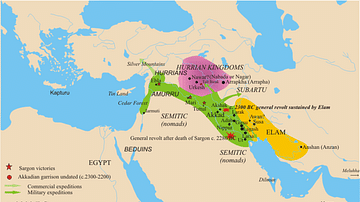
Definition
Akkad and the Akkadian Empire
Akkad was the seat of the Akkadian Empire (2334-2218 BCE), the first multi-national political entity in the world, founded by Sargon the Great (r. 2334-2279 BCE) who unified Mesopotamia under his rule and set the model for later Mesopotamian...
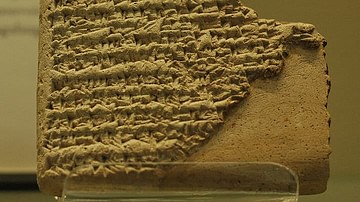
Article
The Legend of Sargon of Akkad
The Legend of Sargon of Akkad (c. 2300 BCE) is an Akkadian work from Mesopotamia understood as the autobiography of Sargon of Akkad (Sargon the Great, r. 2334-2279 BCE), founder of the Akkadian Empire. The earliest copy is dated to the 7th...
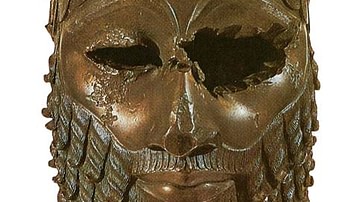
Definition
Sargon of Akkad
Sargon of Akkad (r. 2334 - 2279 BCE) was the king of the Akkadian Empire of Mesopotamia, the first multi-national empire in history, who united the disparate kingdoms of the region under a central authority. He is equally famous today as...
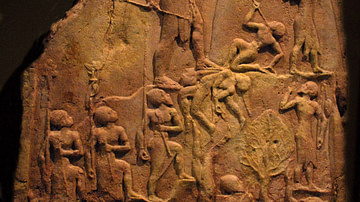
Definition
Naram-Sin
Naram-Sin (r. 2261-2224 BCE) was the last great king of the Akkadian Empire and grandson of Sargon the Great (r. 2334-2279 BCE) who founded the empire. He is considered the most important Akkadian king after Sargon (or, according to some...
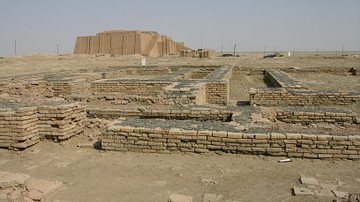
Definition
Ur
Ur was a city in the region of Sumer, southern Mesopotamia, and its ruins lie in what is modern-day Tell el-Muqayyar, Iraq. According to biblical tradition, the city is named after the man who founded the first settlement there, Ur, though...
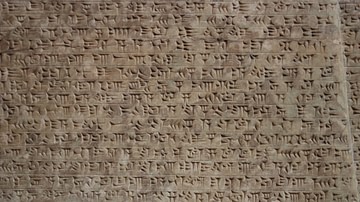
Definition
Enheduanna
The Akkadian poet Enheduanna (l. 2285-2250 BCE) is the world's first author known by name and was the daughter of Sargon of Akkad (Sargon the Great, r. 2334-2279 BCE). Whether Enheduanna was, in fact, a blood relative of Sargon's or the title...
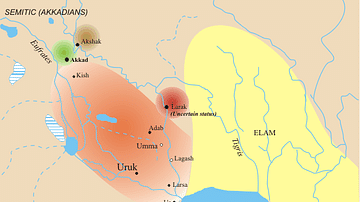
Definition
Uruk
Uruk was one of the most important cities (at one time, the most important) in ancient Mesopotamia. According to the Sumerian King List, it was founded by King Enmerkar c. 4500 BCE. Uruk is best known as the birthplace of writing c. 3200...
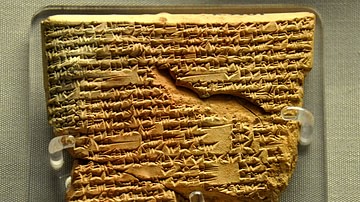
Article
Sargon and Ur-Zababa
Sargon and Ur-Zababa is a Sumerian poem, date of composition unknown, relating the rise to power of Sargon of Akkad (r. 2334-2279 BCE), founder of the Akkadian Empire. The work is classified as a Mesopotamian folktale, relying on motifs such...
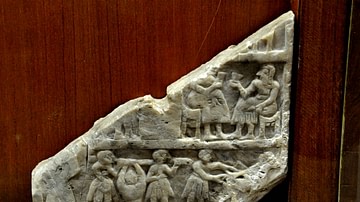
Article
Daily Life in Ancient Mesopotamia
Daily life in ancient Mesopotamia cannot be described in the same way one would describe life in ancient Rome or Greece. Mesopotamia was never a single, unified civilization, not even under the Akkadian Empire of Sargon of Akkad (the Great...
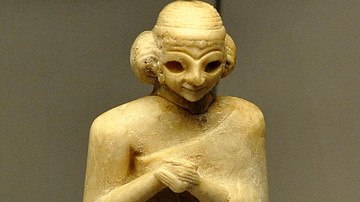
Article
Women in Ancient Mesopotamia
The lives of women in ancient Mesopotamia cannot be characterized as easily as with other civilizations owing to the different cultures over time. Generally speaking, though, Mesopotamian women had significant rights, could own businesses...